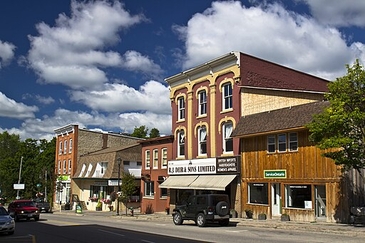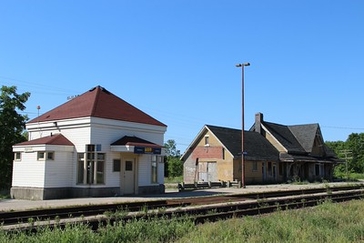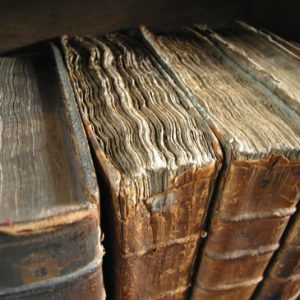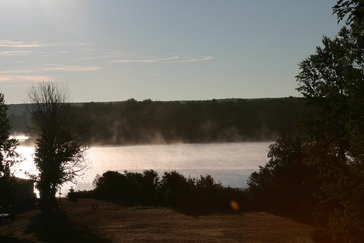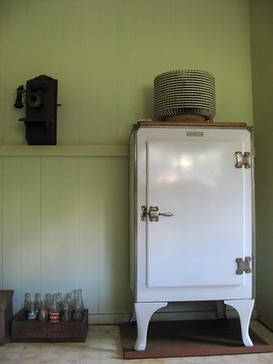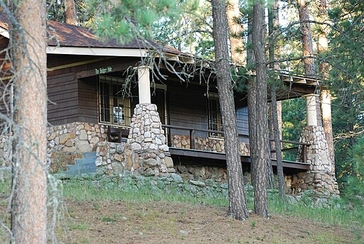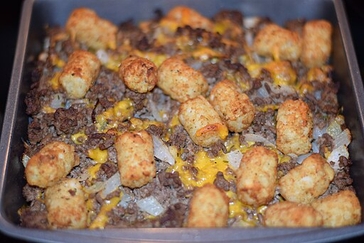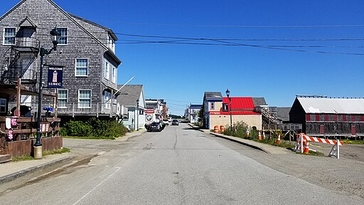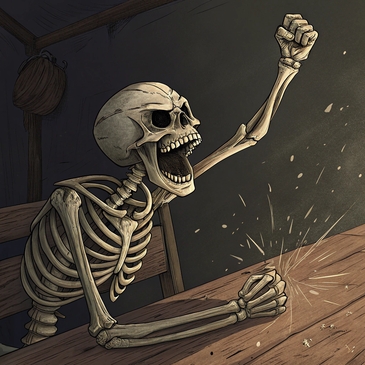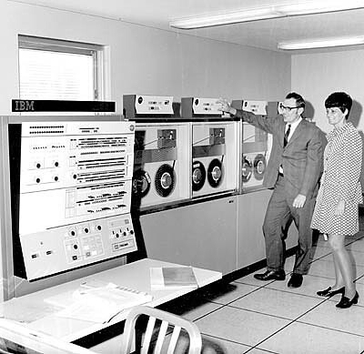The Checker Maven
The World's Most Widely Read Checkers and Draughts Publication
Bob Newell, Editor-in-Chief
Published every Saturday morning in Honolulu, Hawai`i
Noticing missing images? An explanation is here.
Marvin and Josh
Gananoque, Ontario, is a nice little town in Eastern Ontario with a population of about 6,000, and during the summer tourist season it hosts many visitors to the beautiful Thousand Lakes region in which it lies.
Residents of Gan, as they sometimes call it, are torn between their love of the card game Euchre and the great sport of checkers. Gan features a Rookie League team, the Gananoque Goatgetters. Led by rising young star Josh Gordon, the team is considered quite strong in its category, and everyone in Gan knew Josh (who grew up in Toronto) would quickly climb the professional ranks.

This was to be a big weekend in Gan, for superstar Marvin J. Mavin, Captain of the World Champion Detroit Doublejumpers, would to be in town to play a simultaneous exhibition against the the ten members of the Goatgetters, and then run a workshop the following day for the Gananoque High School team.
It was rumored that a couple of scouts from double-A and single-A teams might be watching, so it would be a big weekend for Josh, too, who was hoping to land an offer in a higher league.
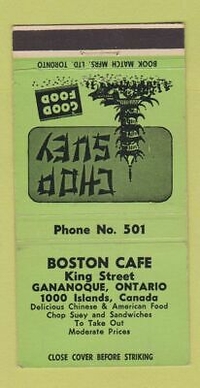
Public Domain
The simul would take place at the site of the old Boston Cafe, now sadly closed, but still used for indoor events such as the this one.
On the evening of the simul, all of the Goatgetters arrived early, awaiting Marvin's arrival. But time passed. The team had a few servings of french fries (with white vinegar, of course) and a couple of soft drinks. They sang the team song, "If You Can, Meet Me in Gan" several times. Still no sign of Marvin, fully an hour after the simul was to begin.
Marvin, however, had just arrived at the Gananoque train station. The Canadian National train that served the station had arrived very late and Marvin was now looking around for his ride. It took him several minutes of head scratching, walking around the station, and turning his head this way and that before he realized no ride had been arranged as Marvin had never told anyone about his plan to arrive by train.
"Yeah, well," Marvin said to himself, "I shoulda told them what train I was on, I 'spose. Heh heh. Well, maybe there's a taxi I can catch."
Of course Marvin didn't know of any taxi companies in Gan, so he got out his phone and did a quick search. "Ah yeah, Gan Taxi, that should be good." Marvin placed the call and a woman answered.
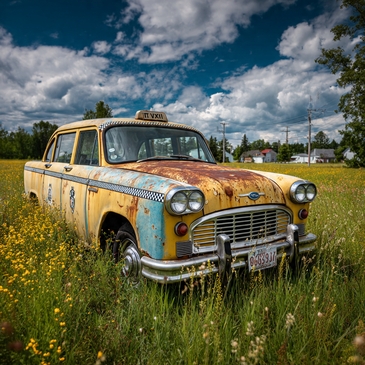
"Gan Taxi."
"Hey, like I'm at the train station and I gotta get to Boston Cafe, can I get a ride? You know, like a taxi ride?"
"No. It's not far, you can walk, buster."
"But I don't know ... "
The call disconnected.
"Well ain't that rude ... walk, huh, but walk where? Boston Cafe ... hmm." Marvin looked for directions on his phone. "Okay yeah here we go!"
He started off on foot, rolling his suitcase behind him, following the directions the computer voice was giving him. "Head west on Station Road ... "

Marvin kept walking, and walking, and walking. "That gal said it ain't far ... what was she talking about?"
It took Marvin almost an hour and a half, and it was nearly dark when he finally arrived at the Boston Cafe. The loyal Goatgetter team members were still there waiting and greeted Marvin with a cheer.
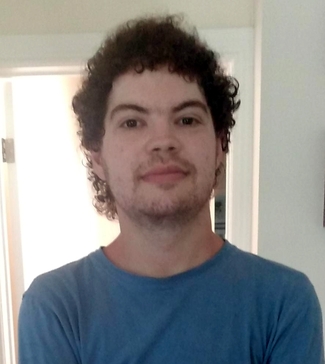
Josh
Josh, as team captain, extended a formal welcome. "Glad you could make it, Captain Marvin. We were beginning to worry and gosh, we didn't have your cell phone number."
"Yeah, I kinda forgot to tell you when my train got in, and that taxi lady said it ain't far and I should just walk."
"I'll bet you called Gan Taxi instead of 1-A Taxi. That lady ... gosh, Captain Marvin, it's over 6 kilometers to the train station!"
"Yeah, I seen it on my phone, but I thought one of them kilometers was like, you know, a city block or something."
"Gosh though, we're happy you're here, no matter. Shall we get started with your simul? Everything's set up and the team is all set to play."
"You keep saying 'gosh.' I oughta call you 'Gosh Josh.' Ha that's good! But hey, I'm kinda thirsty. Can I get like a beer or something?"
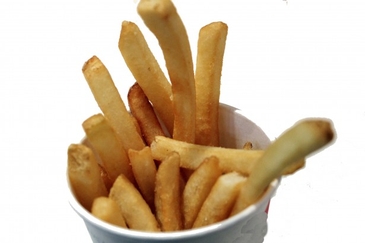
Public Domain Pictures CC0
Josh frowned. "Gosh, Captain, I'm sorry but we don't serve alcohol at our matches. Doesn't go well with good play, you know. We can offer you a cola, and some fries with white vinegar if you like?"
"Oh yeah, well, vinegar, huh? Maybe just the cola if you ain't got nothing else."
Marvin was given an icy cold bottle of cola and, after shaking hands all around, he was ready to take on the ten members of the Goatgetters. By now, though, Marvin was feeling a bit tired from his travel to Gananoque and then the unexpected exertion of a long walk.
The games began. The players on the Gan team were quite talented and as play progressed, Marvin was having to make quite the effort. But he finally pulled off nine wins, two of them very narrow, leaving only the game on first board against Josh to be decided.
The game had reached a tough position, with Josh to move. Now, Josh was so focused on his play that he hadn't noticed two more people coming into the Cafe about 90 minutes ago. He certainly wouldn't have known, though he might have guessed, that they were scouts from the double-A Kingston Krushers and the single-A Guelph Gonotskys.
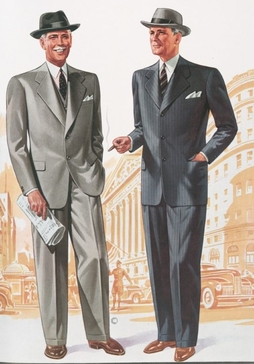
PICRYL CC0
Marvin was smiling. "Hey there Gosh Josh, you're in a kinda pickle. Or maybe a bottle of that there white vinegar! Ha ha! That's a good one!"
Josh didn't reply. Americans, he thought. They had their own strange sense of humour.
But his position, with White, did look difficult.
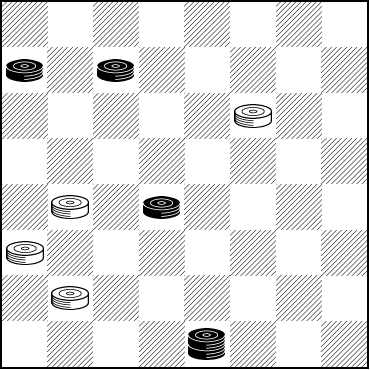
WHITE
White to Play, What Result?
W:W11,17,21,25:B5,6,18,K31
Don't get rattled, Josh told himself. Focus. Look for the hidden resource. Find all the possibilities in the position. Look at the board, not the opponent. Yes, it was Marvin J. Mavin, one of the great players of the day. But that didn't mean giving up without a fight.
A few minutes passed with all eyes on first board, waiting to see what would happen. Finally, Josh nodded his head and made his move.
Are you an up and coming player? Are you a champion of Marvin's caliber? Or are you, like many of us, a regular checker fan who just enjoys the game without professional ambitions? It doesn't matter. Josh's advice is sound. Don't give up without a fight. Don't be intimidated by your opponent or by the situation. Focus.
This position isn't especially easy but something is there, and it's up to you to find it. When you've given it a really good effort, you can focus your mouse on Read More to see the solution and the rest of the story.![]()
You can email the Webmaster with your comments on this article.
Admiral Grey
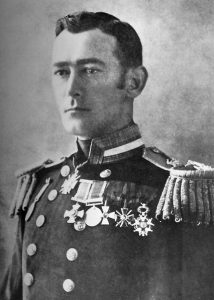
Admiral Grey
Public Domain
In today's column we introduce Admiral Grey, a fictional character who sailed for England in the later half of the 19th century. You can read more of the Admiral's adventures in our ongoing story at www.admiralgrey.com. He's a character we created many years ago, but we didn't know until now about his interest in checkers, or draughts as he would call it.
Not everyone knew everything about Admiral Grey, he who sails the seven seas, he who has fought and likely will fight many a battle for Crown and Country, he who, despite being the nephew of famed Admiral Earl Grey, has made his career on his own, rising from orphaned youth to command rank in the Royal Navy by dint of grit, determination, and hard work.
Everyone knew those things, of course. Those who entered his cabin, the ones closest in rank aboard ship, would know something more. In his cabin one could not help but see the lifelike drawing of his fiancee, Julianna, though that would not tell the tale of their difficult romance, overshadowed by the enmity of Julianna's father. One would see the trappings and tools of office, of course; the British flag, the logbook and sextant, the map table and looking glass.
There were the books, many in number and diverse, from the Greek and Latin classics to the tomes on medicine and science, and of course astronomy and navigation; there were even novels and books of verse for the Admiral was fond of Jane Austen, Sir Walter Scott, Tennyson, and many more.
But there is one thing that they might not see.
It wasn't the small collection of teapots and the larger collection of teas, for the Admiral loved his tea and had teas to suit most moods and situations. Nor was it his curio cabinet, filled with souvenirs and mementos from all corners of the world.
No, it was something else.
While sea voyages may possess a certain mystique, there was plenty of hard and mundane work for everyone, including the Admiral. In-between the relatively brief moments of peril and excitement, such as during a great storm or in the throes of battle, much of sailing consisted of long days and endless nights in an unbroken expanse of sea. At times, if it was never altogether boring, it was certainly routine, and when darkness had fallen and dinner was over, the Admiral would retire to his inner cabin alone.
There, after completing his log-book entries for the day, he would read his books. He would brew a cup of herbal tea, something of chamomile and mint and valerian, blended from a secret formula at Mr. Maxey's shop back in England, and he would enjoy its relaxing effects. But there was one more thing, perhaps one which he enjoyed more than all the others.
From his bookcase he would take out a slim volume of draughts problems, for draughts had somehow always fascinated him, and solving problems--- in his head, for he did not wish to set up a board--- was, to him, great entertainment, a fine compliment to his tea, and a measured bit of leisure activity before his customary five or six hours of sleep.
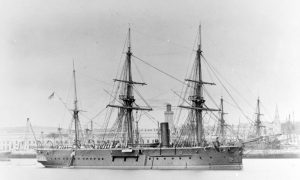
Public Domain
This night was no different. The Admiral was sailing on a special mission between England and Hawai`i, and after a perilous rounding of Cape Horn, weeks of quiet sailing ensued. There were plenty of nights when the draughts book journeyed the few steps between the Admiral's bookcase and the Admiral's easy chair.
With a cup of his "Good Evening" tea by his side, the Admiral was studying the following position.
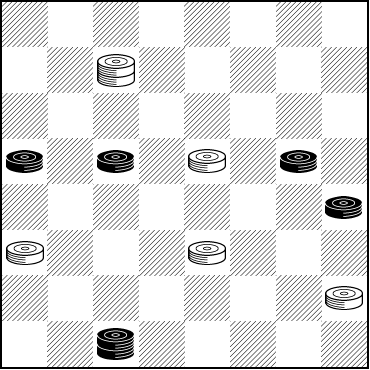
WHITE
White to Play and Win
W:WK6,15,21,23,28:B13,14,16,20,K30
The Admiral was finding it difficult, and the tea and the rolling motion of the ship were lulling him, making concentration difficult. He'd have a few more sips of tea and then sleep; perhaps the solution would come to him overnight, as it so often did for so many difficult problems, and not just of the draughts variety.
Suddenly, he sat up and, now fully awake, exclaimed, "How devilishly clever!" He smiled and drained the last of his tea from his cup. "Marvelous!" he said. "Indeed, a great way to end the day."
With (or without) the tea of your choice, can you equal Admiral Grey and solve the problem? Perhaps late at night when you're sleepy may not be the best time, but only you know when you work best. Give it a try and then sail your mouse over to Read More to see the solution.![]()
You can email the Webmaster with your comments on this article.
A New Member---A Beacon Cafe Story
On a fine fall Saturday afternoon, with the temperature in the upper 50s, the sun shining, and a light breeze stirring the few fallen leaves that had escaped the eager rakes of the residents of Bismarck, North Dakota, Sal Westerman set out for the Beacon Cafe and the weekly meeting of the Coffee and Cake Checker Club. Sal was the unofficial leader and he always looked forward to Saturday afternoons with great anticipation.
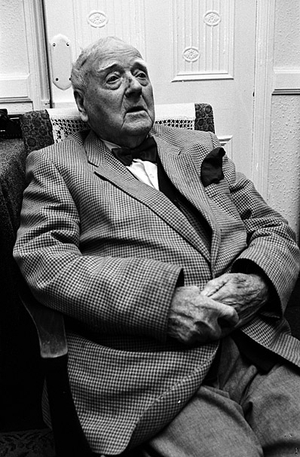
Sal Westerman
The members of the Club, or the "boys" as Sal called them, were all over 50 years old. Sal himself was now in his 70s but he and the rest of the Club members remained active and engaged. After all, what could be more pleasant than an afternoon of checker fun? Add that to Deana's baked treats--- she was the proprietress of the Beacon and a prize winning baker--- and you had everything for which you could ask.
Sal arrived at the Beacon just a few minutes after one o'clock. A few of the boys were already there. Dan, Wayne, Larry, and Louie the Flash were all seated in the big booth in the back with mugs of coffee in hand. Sal greeted everyone and sat down, and then the whole crew got quite a surprise, when in came regular member Tom with a younger fellow. Younger indeed, why, he couldn't even be older than his twenties!

Young Blaine
Upon reaching the back of the Cafe, Tom said, "Boys, I'd like you to meet Young Blaine. He's quite the player. He's new to town, just moved here from Minot to take a job with the electric company. He might just become our newest member."
They all greeted Young Blaine warmly and shook his hand in welcome. Then Tom said, "I explained to Young Blaine how the Club works and how Sal brings us a problem to solve each week, and whether we win it or not determines who buys the treats." Tom smiled. "But I also explained as how a new member buys the treats the first time he attends."
"But," Wayne said, "we haven't had a new member since ... "
"Shush!" Tom said, raising a finger to his mouth.
Young Blaine smiled. He knew what was going on. "Happy to buy," he said, "and happy to be here."

"I've got zucchini nut bars!" said Deana from behind her counter, never missing a chance to market. "Fresh and hot!"
"Tell you what," Sal said, "let's get our treats now instead of waiting, and we can enjoy them while you boys--- and Young Blaine--- work on this one that I got from Brian in St. Louis."
"Hey, Young Blaine, you know about Brian?" asked Louie.
Young Blaine replied, "Sure do. He has some real tough ones in All Checkers Digest."
The rest of the boys exchanged knowing looks. It seemed like Young Blaine was a knowledgeable fellow.
Sal laid out the following problem while Young Blaine bought a platter of zucchini nut bars and Deana refilled everyone's coffee.
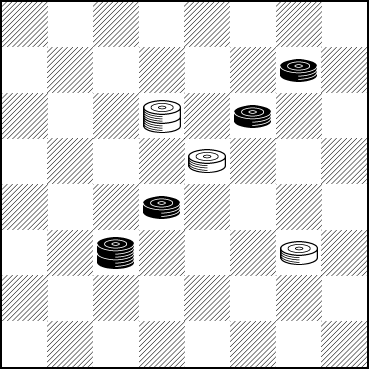
WHITE
White to Play and Draw
W:WK10,15,24:B8,11,18,K22
"Okay boys--- and Young Blaine--- here you go. Take as long as you like."
Everyone, including Young Blaine, set to work. Time passed quickly, as it does when people are enjoying themselves. Finally at about 2:30, Wayne said, "We've got it."
Your age doesn't matter. You might be over 50 or over 70, or even in your thirties or any other age at all. A good problem is a good problem. So see how you do and then click on Read More to see the solution.![]()
You can email the Webmaster with your comments on this article.
The Wedding Plan: A Marvin J. Mavin Story

Marvin J. Mavin, the superstar Captain of the champion Detroit Doublerjumpers in the National Checker League, wasn't having fun.
Recall from our previous story that he had quarreled with his finacee, Priscilla Snelson, who was the President and Chief Executive Officer of Rust Belt Int'l. Holdings. Priscilla thought big, and a big wedding was in the offing. Marvin had been more interested in his checker magazine than Priscilla's wedding catalogs, and that hadn't gone over well.
In fact, Priscilla told Marvin to leave her condo, and then didn't speak to him for ten days. Finally, she accepted his call and let him apologize for what seemed to Marvin like an eternity. Part of the reconciliation was the Marvin would spend a whole Saturday afternoon working with Priscilla on the wedding, and then take her to dinner at Le Faux Luxe, by far Detroit's most expensive and upscale restaurant. (They had planned to go there previously but it was abruptly canceled when Priscilla sent Marvin packing.)

They had been at it for over three hours. "What do you think of these place settings, dear?" Priscilla asked.
"Uh, nice, yeah, I like them," Marvin replied.
"Do you really? Well, how do you think they compare with these?" Prisilla turned a page in the catalog and indicated another option. "Do you think these are a bit more colorful? Or are you looking for something understated and tasteful? I don't mind that, really, but I wonder if the rosettes are a bit too small? Or is that to match the thin gilding?"
"Oh, yeah, the gilding and the roses ... never really thought about that."
Priscilla gave Marvin a bit of a look. "You know, dear, you have to consider these things. Small details add up to the big picture, after all."
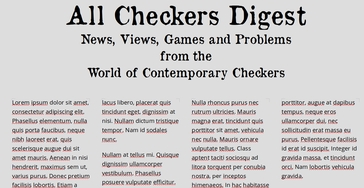
Marvin, wishing he either had a beer or a copy of All Checkers Digest--- he didn't know which one he wanted most at the moment--- replied, "Sure, those details really count, don't they."
"Oh, Marvin, you're not much help, are you? Look we only have two more hours before we have to dress for dinner ... by the way did you bring your dinner jacket? I didn't see it when you came in."
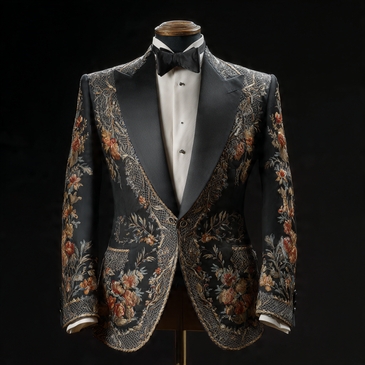
"My dinner jacket? You mean, like that leather one I got at the bar when I ... " Seeing the look on Priscilla's face, Marvin continued, "Nah, I ain't got no dinner jacket. I got a suit at home though, you know, one of them suits with a vest and stuff."
"Oh, you're exasperating!" Priscilla shook her head. "Well, I know you'll be disappointed, but we'll have to postpone the rest of our planning session until tomorrow. We've got to go and rent you a dinner jacket while Twirly Tuxedos and Gaudy Gowns is still open. I suppose you'll need a white ruffle shirt and bow tie, too?"
"A what? No, I ain't got none of those neither."
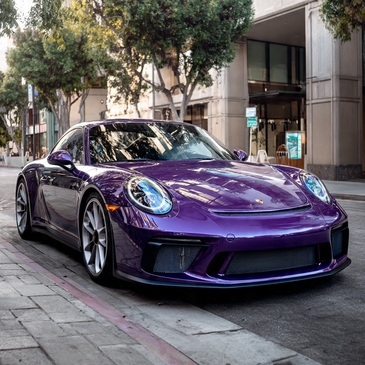
"Once we're married, Marvin, a lot is going to change. Come on, hurry, we've got to go to the shop right away. We'll take the Porsche. It'll take too long to wait for the limo." The Porsche was the car Priscilla drove when she was in a rush, but in her garage she also had a BMW, an Audi, and a Lexus, although she only drove the Lexus on what she called "downscale" occasions. Usually, though, she would just call for her limo and driver.
Marvin's old Volkswagen Beetle was parked outside but he knew better than to ever, ever ask Priscilla to ride in it.
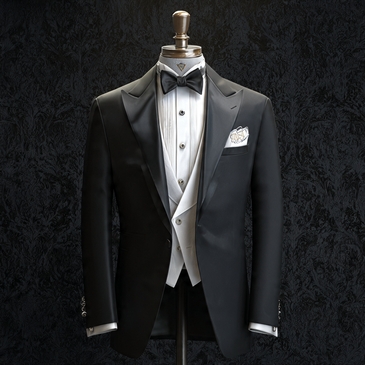
They reached the shop half an hour before closing time. "Just made it," Priscilla remarked as they entered. They were greated by a rotund, bald-headed middle aged man dressed in a white shirt and tie. "Ah, Ms. Snelson!" he said. "So good to see you! You haven't visited us here at Twirly and Gaudy for a while. And who is this? He seems familiar somehow."
"This is Marvin, my fiancee," Priscilla said. "But listen, Stanley, he needs a dinner jacket right away."
"Marvin ... of course! Marvin J. Mavin!" Stanley (the proprietor) smiled broadly. "I just saw you in ... let me see ... " Stanley slipped behind his counter for a moment and returned with a copy of ... American Checker Weekly! He flipped through a few pages. "Look, here's your picture, in that match last week against the L.A. Leapers. Hey, can you maybe autograph this for me? And then there's this problem by Pennsylvania Ed that I'd sure like a hint on if you don't mind ... " Stanley pointed to a checker position diagram.
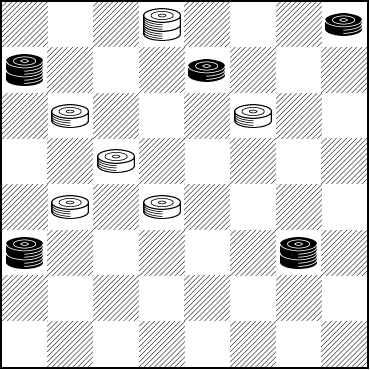
WHITE
White to Play and Win
W:W9,11,14,17,18,K2:B4,7,K5,K21,K24
"Oh, yeah, sure, got a pen?" Stanley offered Marvin a ball point pen, neither he nor Marvin noticing that Priscilla was starting to fume.
Marvin autographed the magazine and said, "Now look, that Penn Ed, his stuff ain't easy, but this one, I think you have to ... "
Priscilla's voice shattered the relative calm. "Stanley, if you don't put that magazine away and fit Marvin for a dinner jacket and ruffled shirt in the next five seconds, I'll blacklist you all over Rust Belt Int'l. Holdings!"
Caught by surprise, the magazine dropped from Stanley's hands. "Yes ma'am, right away ma'am," he said, hustling over to a clothing rack.
"Hey what about Penn Ed's problem ... " Marvin asked.
"Later, sir, later ..." Stanley said.
"You mean never sir, never," Priscilla said.
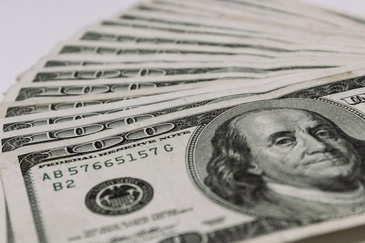
Freerange Stock CC0
Twenty minutes and hundreds of dollars later, a grim Priscilla and a glum Marvin left the shop with a package containing Marvin's dinner clothes.
"That much dough for a one-day rental? Seems like a lot," Marvin said. Priscilla simply said, "In the car, Marvin. We still have to change and I will not be late for our reservation at Le Faux Luxe."

"Yes, dear," Marvin said. No beer, no magazine, no checker problem. Just a fancy dinner suit that cost him hundreds to rent, and a restaurant with waiters that would look down their nose at him if he ordered a Bud Lite, and probably hundreds more for the dinner, not to mention endless hours of wedding planning tomorrow.
But Marvin's heart was in the right place. For Priscilla, he'd do anything. Even pass up a checker problem by Pennsylvania Ed.
We don't know if you have a wedding to plan, or a fancy dinner to go to, and neither do we know if you own a dinner jacket. It doesn't really matter, and you don't have to pass up a problem by Pennsylvania Ed (also known as Grandmaster problem composer Ed Atkinson). See if you can solve it, and then marry your mouse to Read More to see the solution.![]()
You can email the Webmaster with your comments on this article.
A New Season at the Beacon Cafe
It was the Saturday after Labor Day, 1955, and to Sal Westerman that meant one thing.
The new "season" would open for the Coffee and Cake Checker Club, of which Sal was the informal leader. The summer break was over (the club broke off its weekly meetings after Memorial Day) and every Saturday from now on, except for the Thanksgiving and Christmas holidays, the "boys" (all of whom were at least 50 years old) would gather at the Beacon Cafe, to enjoy coffee, some of the best baked goods to be found anywhere, and of course comradeship and checkers.

Sal Westerman
There was a spryness in Sal's step as he left his home for the ten minute walk to the Provident Life Building, where the Beacon Cafe was located. Sal left early so he could arrive first and welcome the boys back.
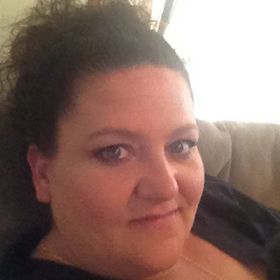
Deana Nagel
On reaching the Beacon, he greeted the proprietress, Deana, who was all smiles. "Welcome back, Sal," she said, "great to see you again!"
"How was the soybean crop this year?" Sal asked. Deana closed the Cafe during August so she could go to the family farm in Gackle and help out with the busy harvest season.

PICRYL CC0
"Oh, pretty good," Deana replied, "but it's always nice to get back here and bake treats for my favorite customers. Walnut chocolate chip cookies today, you know!"
"Sounds great," Sal said, and just then in came some of the boys: Delmer, Wayne, Sam, and Louie. There were greetings and handshakes all around and wouldn't you know, here came Tom, Ron, Dan, Mike, and even the seldom-seen Frank! That made for a turnout of ten, a really big crowd. Everyone got their coffee and this week they needed two of the big booths in the back of the Cafe.
Now, the tradition was that Sal would bring along a checker problem with which to challenge the boys. If they could solve it, Sal would buy the treats for everyone. If they couldn't win it, the boys would buy for themselves and Sal.
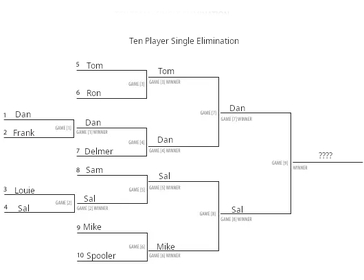
But this time Sal said, "Let's try something different. How about we have a quick single-elimination tournament, half a minute per move, play until someone wins in each match-up, and the overall winner shares the glory by buying the treats?"
Louie thought that the winner, being the winner, maybe shouldn't have to buy, but he went along with the crowd, who thought it would be more fun that way.
Dan
The little tournament quickly got under way and within 90 minutes or so, it was all down to Sal and Dan, so this final game would be decisive. They agreed that if it was a draw, they would share the honors and share the cost of the treats.
Now, Sal was the State Champion and favored to win, and he wanted to win, for he was a very generous person and especially wanted to buy for everyone on the first week back after the summer. But he would have to win that "right" over the board.
After some brief play the following very unusual position arose, with Sal to move. He knew he had a chance to win but he only had half a minute to figure out the right play, and it looked really complicated.
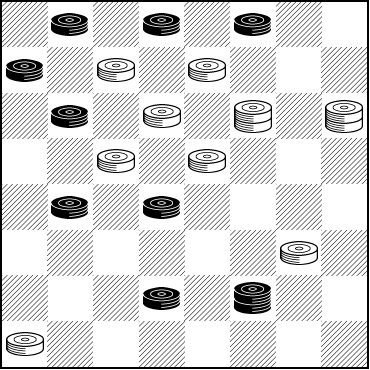
WHITE (Sal)
White to Play and Win
W:B1,2,3,5,9,17,18,26,K27:W6,7,10,14,15,24,29,K11,K12
Just at the very end of his half minute, when Dan was about to call "time" Sal made his move.
Can you win this one? Do you think Sal found the winning way? You won't have to buy treats (unless maybe you're solving in a group), but you can still claim a little personal glory. See how you do and then click on Read More to see the solution and the rest of the story.![]()
You can email the Webmaster with your comments on this article.
Marvin J. Mavin: A Very Large Problem
The Detroit Doublejumpers had just completed annual pre-season training camp at the appropriately named location of Au Train, Michigan. It was always a difficult time for the players, who were really put through their paces both mentally and physically, but no one more so than team Captain Marvin J. Mavin, who had to give up beer, run endless laps around the lake, and even do push-ups sometimes.

After camp the team had a traditional week off before they played some exhibition games prior to opening the regular season. It was a Saturday afternoon and Marvin was visiting with his fiancee, Priscilla Snelson, at her very large swanky new condo, one she bought after she was made CEO of Rust Belt Holdings, a position which came with a very large salary.
Priscilla and Marvin planned on a relaxing afternoon together followed by dinner at a restaurant chosen by Priscilla ... which, of course, was upscale and expensive, boasted two Michelin stars and featured a very large French menu.

Marvin was on one of the couches in the very large living room, reading an issue of All Checkers Digest. The magazine always contained a few challenging checker problems and Marvin was just starting to really get involved with one of them.
BLACK
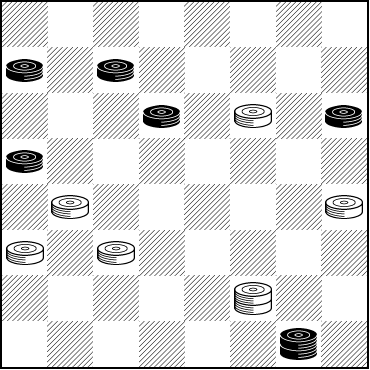
WHITE
White to Play and Win
W:W11,17,20,21,22,K27:B5,6,10,12,13,K32
"Marvin, dear!"
Priscilla's voice, sweet though it was, cut through Marvin's concentration.
"Yeah honey, what is it? Hey, by the way can you bring me a beer? I'm working on this problem ... "
The voice now took on a definite edge. "Get your own beer, dear, and while you're at it come over here. I want to show you something."

Marvin reluctantly got up and went into the very large kitchen. Priscilla was seated at the very large kitchen table with magazines of her own spread out in front of her. "What do you think about this, Marvin? It's in the latest issue of the Beautiful Blissful Bride's Best Boutique magazine ... "
"Bride's Best ... what did you call it? Bo Peep or something? Hey, anyhow, they got a checker column in that magazine?"
"Marvin, be serious!" Uh-oh. Marvin knew it was never good when Priscilla told him that. She continued, "I want to know what you think of this bride's dress for our wedding."

Marko Milivojevic CC0
Now, Priscilla was planning a very large wedding. They had yet to set a date but she said it would take her at least six months, and probably a lot longer, to get everything arranged. There would be a very large guest list, a very large cocktail party, a very large dinner, and a very large send-off following a very large dance party.
Marvin, knowing that, unfortunately replied, "Gee, Prissy, the wedding ain't for probably a year yet, what's the rush? And besides I don't know nothing about wedding dresses."
"Marvin! I don't think I like your attitude. And how many times have I told you, don't call me Prissy!"
Marvin quickly backtracked. "Aw gee honey, I'm sorry. Here lemme see the dress."
Priscilla relented, but only a little. "Here you go," she said, pointing to a very large centerfold in the magazine.
"Yeah, great! Sure does look like a wedding dress, don't it? I mean, it's got all of them ruffles and stuff ... but I kinda think you don't look like ... "
Priscilla, now very angry, slammed the magazine shut. "Oh Marvin, you're so ... so ... useless! How will I ever get this wedding arranged if you don't help?"
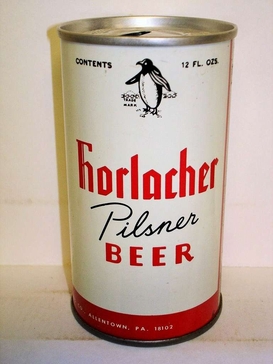
PICRYL CC0
"A beer right now would help ... ' Marvin said, again unthinkingly.
Priscilla stood up, hands on hips. Once more, not a good sign. "You'll get a beer over your head!" she said. "And don't open that fridge ... or else! It's getting close to time to leave for Le Faux Luxe in any event.
Marvin, who was halfway to Priscilla's very large fridge, stopped in his tracks. "Aw, gee, Prissy, gimme a break. One beer, okay? That fancy place ain't got nothing but old wine and them funny colored cocktails."
Priscilla, still glowering, thought for a moment. "You know, Marvin, you're right. You need a beer. You don't need an elegant candlelight dinner of haute cuisine, fine wine, and superb service. So how about you take your silly checker magazine and go down the block to that bar you love so much and have a beer and a burger? You can call me in a couple of days when you've seen the light and are ready to help with the wedding."
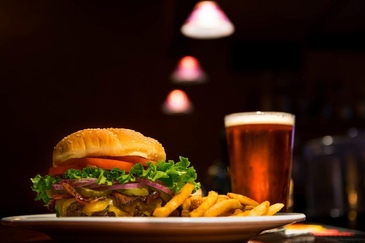
Freerange Stock CC0
"Hey, yeah, can I have fries with ... oh, okay." He quietly picked up his All Checkers Digest, went out and took the elevator down to street level. At least he had a very large beer and a very large burger to look forward to. With fries. Of course, making up with Priscilla would be, as always, a very large problem, but he'd work it out.![]()
You can email the Webmaster with your comments on this article.
A Saturday in August
It was August, usually one of the hottest months of the year in Bismarck, North Dakota, and 1955 was no exception. Although North Dakota is often rightly thought of as a very cold place, summers, though brief, could be scorching hot, with temperatures above a hundred degrees on some days.
Sal Westerman, the unofficial leader of the Coffee and Cake Checkers Club, usually stayed in town during August. His wife Sylvia always went to Dickinson to spend two or three weeks with her sister, and while she was away Sal would retreat to the relative coolness of his basement to read his checker magazines and do some study from his large checkers library. The Club didn't meet during the summer, and in fact their usual venue, the Beacon Cafe, closed down in August so the proprietress, Deana, could go to Gackle to visit with family and help with the wheat harvest.
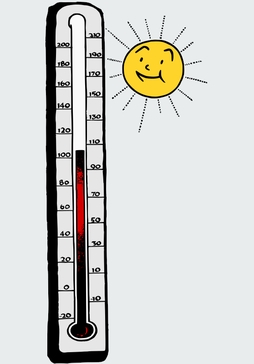
openclipart.org CC0
On this Saturday the temperature reached 105 degrees in the early afternoon, and Sal didn't plan to leave his basement except if absolutely necessary. There was a bathroom as well as a small refrigerator, and it was just too hot to venture into the upper floors of the house. But by later in the afternoon even the basement was just too hot. Still, there was nowhere else to go. The big floor fan was already at full blast. Nothing to do but stick it out.
Sal had been working from a new problem book that All Checkers Press had just published. Sylvia had given it to him as a birthday gift. It was a nice collection and included problems by two of his checker pen-pals, Brian and Ed.
The heat was starting to make Sal, who after all was in his seventies, a bit sleepy. Then Sal did something that he didn't do very often; he got a beer from the fridge and opened it up. Sal would have the occasional social drink but seldom anything but that. It was the heat, and he wanted something cooling. It was too hot to eat anything, but a cold drink would be nice.
Sipping his beer and working on a few problems, he suddenly became aware that the room was getting darker. Now, the basement wasn't all that large. There was the furnace, of course, a half bath, a lot of storage cabinets, a workbench, an easy chair and an old couch, and a small table in the middle served by a couple of battered kitchen chairs. There were several casement windows on the walls, up near the ceiling. There was an overhead light and a couple of floor lamps.
Now, it was odd. The lights were all on but they didn't seem to be giving off more than a faint glow. Sal looked up at the windows and it was pitch black outside. Was it storming, or had he fallen asleep and it was now well after dark? No, his beer was still cold, in fact ice cold, colder than the old fridge could have ever made it.
Sal thought he had best go upstairs and check around. That's when he got the biggest surprise of all.
There was a wall where the stairway leading upstairs used to be. Not even a new looking wall, but just a continuation of the walls in the rest of the room.
Sal started to be frightened. This just wasn't possible ... was it?
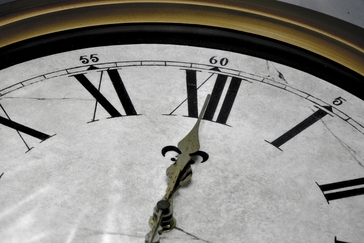
Needpix CC0
And there was an eerie silence. Not a sound came from outside. Another shock: the electric wall clock had stopped, the second hand no longer sweeping, the time 12:00. Exactly midnight, Sal realized. But if the electric clock was stopped, how could the electric lights be on, even though only barely?
Now, stay calm, Sal told himself. Sit down at the table, take a few deep breaths.
The table was gone. So were the chairs. In fact everything in the room seemed to be fading away, as if darkness were seeping in and dissolving reality.
The walls were no longer visible, nor were the floor or ceiling. Sal now felt a floating sensation, and then a breeze that turned into a wind that pushed him along in total darkness.

stockvault CC0
It seemed to go on forever, the wind stronger and stronger, Sal being carried faster and faster. And now along with the darkness he heard an unearthly howling that grew so loud Sal thought his ears would burst.
Suddenly it was over.

Pexels CC0
Sal was standing in a large room, in front of a long table. Everything in the room was glowing red as if on fire. Seated behind the table were Brian, Ed, and--- Sylvia! After a moment, Sylvia spoke. "You have been called before this tribunal to stand in judgment. How do you plead, guilty, or guilty?"
Sal was in shock. Finally he managed to say, "Have I died? Is this the Last Judgment? But why aren't there ... you know ... angels and ... St. Peter? And Sylvia ... why are you here?"
"Answer the question, mortal. Do you plead guilty, or guilty?" Brian said.
"Yes," added Ed, "you must plead either guilty or guilty. After all, we know you're guilty, don't we?" Ed laughed manically and the others joined in, the laughter swelling and ringing in Sal's ears.
"Guilty of what?" Sal said. "I say, not guilty of ... whatever it is!"
"Not guilty?" said Sylvia. "You must plead either guilty, or guilty! Everyone must obey! Everyone is guilty and everyone is condemned! We do not accept your plea and we find you guilty. You are hereby sentenced to ... "
Sylvia paused and waved her arms at Brian and Ed. "All together now boys, let's hear it ... "
Sal opened his eyes. His head was resting on his new problem book and he was drenched in sweat. Slowly, he raised his head and looked at the electric clock. It was nine o'clock and, glancing at the windows, he saw it was getting dark.
He must have finished all of his beer, as the bottle was empty.

Uh-oh. There were three empty beer bottles on the table. Guilty, or guilty? Everything fell into place and Sal understood.
Sal took one last look at his checkerboard, which had the following position on it.
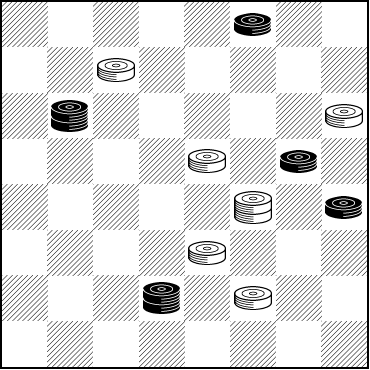
WHITE
White to Play and Win
W:B3,16,20,K9,K26:W6,12,15,23,27,K19
But he shook his head and said to himself, "Too much checkers today. Too much heat. Too much beer. Too much ..." He shook his head again. He had had a terrible dream. "Better just get to bed," he concluded, "and it sure will be nice when Sylvia--- the real-life Sylvia--- gets back home."

Sylvia Westerman
We hope you don't ever have a bad dream like Sal's. We also don't recommend three bottles of beer on an empty stomach, or at all for that matter, especially when solving checker problems. Can you solve the position shown above? Don't let it give you nightmares; you can always click on Read More to see the solution.![]()
You can email the Webmaster with your comments on this article.
Gone Fishing: A Beacon Cafe Story

Sal Westerman
Sal Westerman, of Bismarck, North Dakota, was doing what he did every summer.
It was July of 1955 and Sal and his wife, Sylvia, were spending a couple of weeks at a lakeside cabin near Lake Sakakawea. For years they had rented the same cabin for the same two weeks.
Sal of course missed his Saturday afternoon visits to the Beacon Cafe in Bismarck, where his Coffee and Cake Checker Club met weekly during fall, winter, and spring. But like most such things in North Dakota, there was a pause to enjoy the all-too brief summer season, and the club wouldn't meet again until the Saturday after Labor Day.
At the lake, Sal and Sylvia didn't follow any particular schedule. They went to bed when they were tired, got up when they were ready, went on walks, relaxed on the porch, and just took it easy. Sal, of course, brought along some checker magazines.
This morning, however, Sal decided to take a rowboat out on the lake and try some fishing. At least, that's what he called it. What he actually did was row the boat out a ways, drop a line in the water, and then get out a checker magazine. If a fish bit that was fine but he really didn't care. Sylvia, of course, always hoped he'd catch something to cook for dinner, but she knew Sal's habits and tricks and didn't count on anything.

Public Domain Pictures CC0
It was a clear and sunny morning, and it was going to be hot, so Sal knew he should go out early. The fish wouldn't really be biting once the temperature rose, but worst of all was that it would be just too warm out in the sun to focus on his magazine. So Sal rowed out at 7 AM right after an early breakfast.
"Good luck, dear," Sylvia had said, not failing to notice the copy of All Checkers Digest in Sal's tackle box.

It was still nice and cool when Sal put a lure on his hook and cast out his line. Then with a smile of anticipation, he opened up his magazine. Sal loved all the news, features, and analyzed games from professional play, but he especially enjoyed the checker problems, and this issue featured one by his friend Ed from Pennsylvania. Opening up the magazine, he quickly found the problem and was soon absorbed in trying to work out the solution.
Ed Atkinson
BLACK
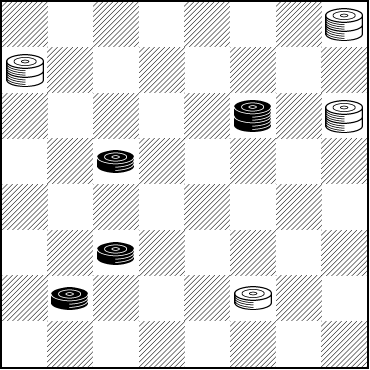
WHITE
White to Play and Win
W:WK4,K5,K12,27:BK11,14,22,25
He was deep in thought when he heard the line on his fishing reel start to run out at a rapid pace. There was a fish on his hook and it must have been a big one!
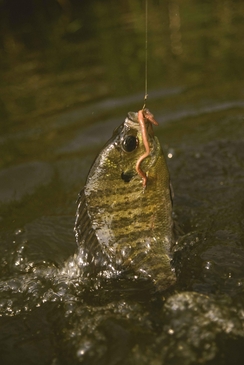
Pixnio/US Fish & Wildlife CC0
He set his magazine down on the seat beside him and took his pole from its holder. The fish was still running out as his started to crank on his reel, trying to pull it back in. It was a back and forth tussle and after about five minutes both the fish and Sal were starting to tire. Slowly but surely, Sal was making headway, pulling the fish closer and closer. Soon he could see the fish almost next to the boat, near the surface of the water. Now, where was that fish net ...
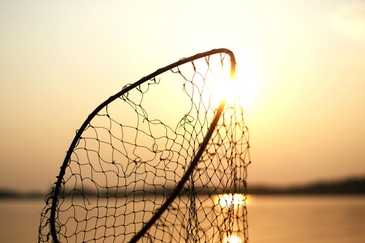
Emily Hopper stocksnapio CC0
While still holding his pole with one hand, Sal reached down and grabbed the handle of his net. He pulled it up ... and wouldn't you know it but the end of the net hit his checker magazine and knocked it into the water!

Sal dropped his pole into the boat and reached out with his net to try to catch his magazine, which was slowly starting to sink. Completely forgetting about the fish, he went desperately for the magazine, but it was too late. The magazine had sunk out of reach. For a moment Sal thought about diving into the water after it, but at 73 years old diving into cold lake water wouldn't have been a good idea, and if he caught a cold from it he'd get the dickens from Sylvia.
Finally remembering the fish, he turned to the other side of the boat. But by this time, it seemed, the fish had somehow wriggled off the hook and was gone.
Despondent, Sal rowed back to shore, moored the boat, and went back into the cabin.
Sylvia was at the kitchen table doing a crossword puzzle. "Back so soon, dear? Any luck?"

Sylvia Westerman
Sal slowly recounted the story of the big one that got away, and the lost copy of All Checkers Digest.
"Oh, Sal, I'm so sorry you lost the fish. It would have made such a nice dinner. And the magazine, too, although I know you brought along several others."
"Yes, I did," Sal replied, "but this was the latest issue, and I was just starting to make progress on this problem by Ed ... "
"It's a shame, dear, but I'll make you a nice dinner tonight and you'll feel better about everything, I'm sure. How about a macaroni and hamburger hot dish?" Sylvia knew that was one of Sal's favorites, and she spiced it up with some tangy cheese.
"Oh, yes, dear, thank you, that would be wonderful." But Sal still looked despondent.
It was about time for lunch and they had a ham sandwich with some canned tomato soup. Sal then announced he would take a short rest and Sylvia said she would need to drive into town to pick up some ground beef and a package of macaroni for tonight's dinner.
After washing dishes, Sal lay down while Sylvia headed off for town. Sal awoke an hour or so later and Sylvia was just coming back into the cabin with a bag of groceries.

Public Domain Pictures CC0
"Unpack for me, will you Sal, while I freshen up a little. It's so hot out now!" Sylvia said, placing the bag on the kitchen table.
"Sure," Sal said.
Macaroni went into the cupboards, ground beef into the refrigerator, and so on. "Quite a lot of groceries," Sal remarked, but got no reply.
Wait ... what was that in the bottom of the brown paper shopping bag?
No, it couldn't be. Sal had to look twice, then a third time. Slowly, he took the item out, looking at it in wonder.
"Surprised, dear?" Sylvia asked, now standing at the dining table.
"My goodness," Sal said, "how did you do it?"
"Oh, it wasn't hard. It's a pretty popular item, after all. Just about everyone carries it."
Sal smiled as he looked lovingly first at his wife, and then at the copy of the latest issue of All Checkers Digest that he held in his hands.

It looks as though Sal is going to get to try to solve that special problem after all, and of course you can, too. After you've tried it, though, there's no need to go fishing for the solution; just cast your mouse on Read More to see how it's done.![]()
You can email the Webmaster with your comments on this article.
Marvin in Maine

Marvin J. Mavin
In May, Marvin J. Mavin had once again led the Detroit Doublejumpers to another World Series of Checkers Championship, defeating the Los Angeles Leapers over the course of seven hard-fought matches.
June and July were off months; training camp didn't take place until August. Marvin and his financee, Priscilla, usually took separate vacations in June and a vacation together in July.
This year Marvin decided to go to Maine. It would be just about the start of the height of the lobster season, and there would also be fresh fish caught in cold Atlantic waters, of course with a nice crisp beer (or two) as an accompaniment.
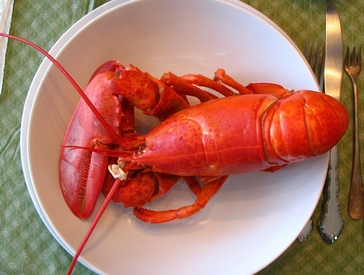
PICRYL CC0
It was quite a drive from Detroit to Loobish, Maine, especially in Marvin's very old Volkswagen Beetle. He took his time and after two overnight stays, checked into The Lobster Loft, a well-known pub and restaurant with several rustic rooms to rent.
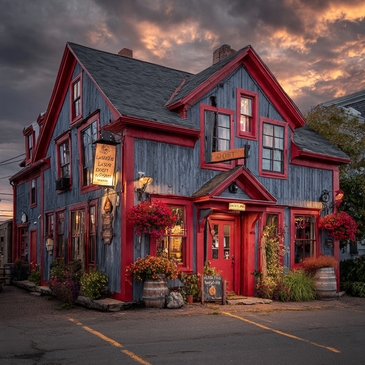
Marvin spent a day or two exploring the town, trying to remain incognito, as even remote Loobish had its checker fans, and the town had an amateur team appropriately named the Loobish Lobsters, who competed in a league in eastern Maine.
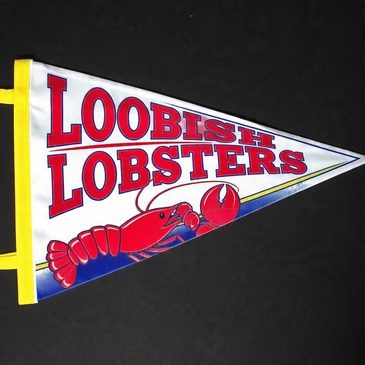
Of course, a star such as Marvin couldn't help but eventually be noticed. However, though Maine folk are very friendly, they do respect a person's privacy, so Marvin didn't have to do a lot more than sign a few autographs, shake a few hands, and pose for some selfies.
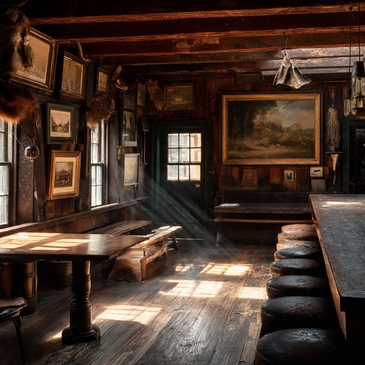
About a week into his visit, Marvin was enjoying some local brews in the Loobish Tavern. He had gotten to talking with a few of the lobster fisherman and raised a couple of glasses with them. Well, maybe more than just a couple. But fishermen rise early and by about 11 o'clock the tavern was empty except for Marvin and the bartender. Closing time wasn't until one AM but the bartender looked tired so Marvin called for one last beer before going back to his lodgings.

He must have taken his time with his beer, for as he drained the last of it he looked up at the tavern's old wall clock and saw that it was exactly midnight. He was going to get up to leave but all of a sudden he noticed a large, middle-aged, ruddy-looking man sitting opposite him at his table.
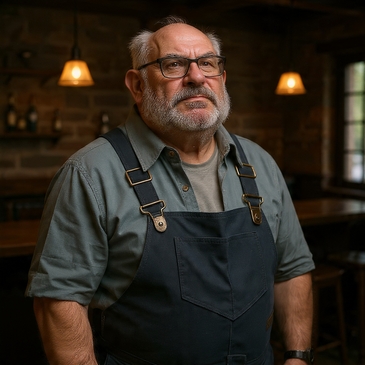
The Great Murray
"Where did you come from?" Marvin said, startled by the man's sudden appearance.
"Where did I come from?" the man replied in a voice that was shaky and distant. "What do you mean, where did I come from! Don't you know me? Everybody around here knows The Great Murray! John Murray, that's me, and they call me The Great Murray because of how well I play checkers. The best in Eastern Maine. Maybe the best in all of Maine. Might even be the best in the world only haven't quite got the title yet."
"But," he continued, "I'm going to get there, and I'll start by beating you. Yes, you're some kind of hot-shot professional but I'm not scared, no sir I am not, because you're nothing compared to The Great Murray."
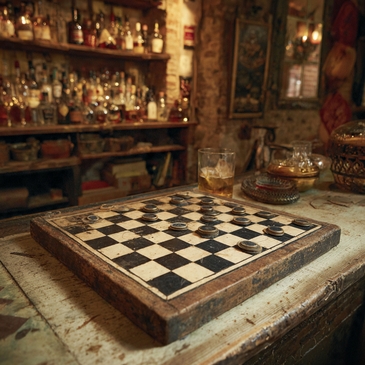
Suddenly there was a rustic old checkerboard on the table. Murray set it up and quickly made a move with the Black pieces. "Now there, your turn, so play."
Marvin, still startled, replied, "Hey, look, whoever you are, it's kinda late and I've had a couple of ... well a few ... quite a few ... anyhow I want to get to bed, so look, why don'tcha come back another night."
"Play, I said!" Murray banged a fist on the table. "Play if you'd like to get to bed in one piece tonight!"
"Aw, c'mon now ... "
Now the fist was inches from Marvin's face. Marvin looked over at the bar, but the bartender was nowhere to be seen.
A sudden shiver went through Marvin's body. Without even meaning to, he reached out his hand and made a move.
The game went on, Murray glowering all the time. Once or twice Marvin made as if to get up and leave, and on each occasion Murray said, "You may not leave unless you resign the game!"
Eventually the play led to the following position.
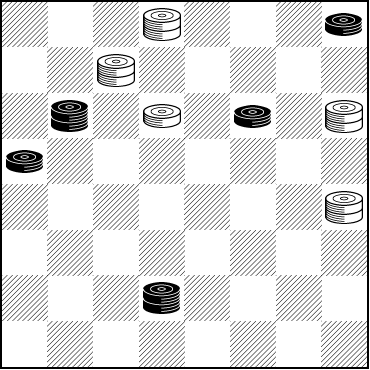
WHITE
White to Play, What Result?
W:WK2,K6,10,K12,K20:B4,K9,11,13,K26
"Ha ha ha," Murray laughed, "you shall lose now. And you know what shall happen then? I will spread the word far and wide that The Great Murray beat this so-called professional champion, and you shall see if any pro team wants you after that. You shall die poor lying in the gutter because tonight is when your career ends."
Marvin heard these words, stunned. But something must have gotten through to him, because all at once, he sat up straight and said, "Now wait a minute there pal, just who do you think you are? Great Murray? You ain't great anything, 'cept maybe a Great Windbag! Now take this, you old blowhard!"
Marvin looked down at the checkerboard and made his move.
Is The Great Murray all that great? Is he the equal of Marvin J. Mavin? Are you up to Murray's challenge? See how you do with the position above and then click on Read More to see the solution and the conclusion to our story.![]()
You can email the Webmaster with your comments on this article.
The Last Problem
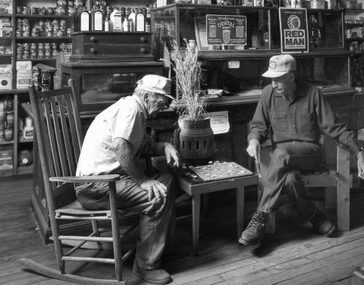
Pixabay CC0
Many years ago, when checkers was played by man and by man alone, for there were no computers nor would there be for almost two centuries, a legendary person created a 9x9 checker problem that challenged the best players of the day; and yet they solved the problem despite its depth, trickery, and unusual nature. The creator of the problem was said to be named Hink, or perhaps it was The Hink, or perhaps it was someone else, for no one really knew, and yet the problem was known as Hink's Problem.
Down through the ensuing generations, Hink's Problem entertained and baffled, yet still, the best in each generation would solve it with enough thought and reflection.
And then came the time of the computers.
The earliest, created by a researcher at a large corporation, did not play checkers very well and of course could not solve Hink's Problem.
More computers arrived and more checker engines were created, and though they bore names like Fiend and Giant and Mountain Wind, and even Crowning Touch and Cookie--- the latter two being the greatest of their day--- still they could not solve Hink's Problem while the masters and grandmasters, all of them fully human, were able to succeed.
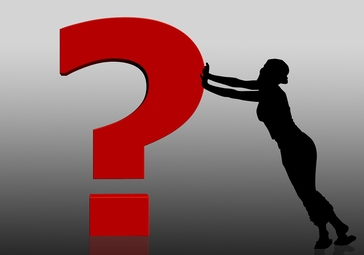
Needpix CC0
And so arose the Checker Question: Would, one day, computers solve Hink's problem?
More time passed and more generations came and went, and computers became universal, and beyond the comprehension of man, so incredible was their power. Men no longer designed new computers; the computers themselves did that until they became seemingly omnipotent. Yet still, they could not solve Hink's problem, while human masters--- the few that there still were--- would do so.
Millennia turned into millions of years and millions of years turned to billions, and the computers merged into one great Omnicomputer that integrated with the very fabric of the universe. But Hink's Problem remained beyond them. There were no humans left to solve it, for they had all moved into a higher plane of existence, but had there been any, they would surely have found the solution.

Public Domain Pictures CC0
Finally, the universe began to darken. The Omnicomputer had long known that the omega constant was less than one and the universe would eventually face heat death.
The last star winked out, and still Hink's Problem was beyond the Omnicomputer. It was the last unsolved problem that the great engine faced, and it could not shut down until the solution was found.
Finally, after so long that time no longer had any meaning, the Omnicomputer said, "It cannot be done" and this so upset the Omnicomputer that it erupted from its containment in the hyperdimensions, creating a New Big Bang that would give rise to a new universe, perhaps one in which the laws of logic would differ enough for Hink's Problem to be solvable, not just by humans, but by a mere Omnicomputer.

Public Domain Pictures CC0
With appreciation to Isaac Asimov, whose classic The Last Question inspired this story.
BLACK
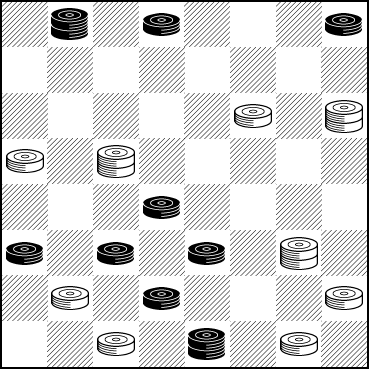
WHITE
White to Play and Win
W:W11,K12,13,K14,K24,25,28,30,32:BK1,2,4,18,21,22,23,26,K31
The Omnicomputer couldn't solve this one and had the cyber equivalent of a nervous breakdown. Can you solve it? It's probably at grandmaster level, but it's fascinating and worth your time. Just don't get so upset that you explode! After all you can always give your mouse a big bang on Read More to see the solution.![]()
You can email the Webmaster with your comments on this article.
The Checker Maven is produced at editorial offices in Honolulu, Hawai`i, as a completely non-commercial public service from which no income is obtained or sought. Original material is Copyright © 2004-2026 Avi Gobbler Publishing. Other material is public domain, AI generated, as attributed, or licensed under CC1, CC2, CC3 or CC4 and the various CC options. Information presented on this site is offered as-is, at no cost, and bears no express or implied warranty as to accuracy or usability. You agree that you use such information entirely at your own risk. No liabilities of any kind under any legal theory whatsoever are accepted. The Checker Maven is dedicated to the memory of Mr. Bob Newell, Sr.
